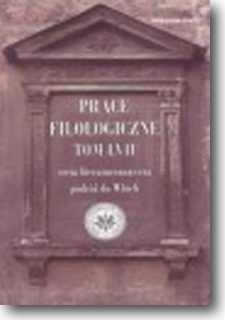„{Omnes viae romam ducunt}”. Peregrynacje do rzymu W czasach pierwszego jubileuszu
“{Omnes Viae Romam Ducunt}”. The 1st Jubilee Roman Peregrinations
Author(s): Olaf KwapisSubject(s): Language and Literature Studies
Published by: Wydział Polonistyki Uniwersytetu Warszawskiego
Keywords: podróż; pielgrzymka; rok 1300; Rzym; journey; pilgrimage; year 1300; Rome
Summary/Abstract: “All roads lead to Rome” - this ancient maxim reminding us of the Roman Empire’s excellent communication routes still suggests that the Eternal City is the destination of all European quests. Revived after the breakdown of pilgrimages to the Holy Land (after the 1291 fall of Acre), these quests also mentally transferred the Celestial Jerusalem to the area of River Tiber. The renewal of the quests was motivated by sanctioning the purgatory and consequently indulgence as the promise of quick salvation of the souls of dead kin from the “third place”. Human economy was thus inscribed in the economy of salvation, with Rome becoming the aim for pilgrims wanting to receive indulgence, and plenary indulgence - in particular ({plenissima venia peccatorum}), i.e. the absolution of sins which up till that moment only crusaders cherished. This indulgence could be granted only to those arriving in Rome in the Jubilee Holy Year of 1300 when Pope Boniface VIII revived the idea of the Great Jubilee. The article presents historical and theological conditionings of the penitential quest to Rome. It also characterizes the road net pertaining to the pilgrimages in question, in particular {Via Francigena}, only to reconstruct the figure of pilgrim as peregrinating first to Rome and later, within the city, following the so-called Seven Basilicas Route. This anthropological description closes with the review of the oldest guides to the Eternal City, which propose Roman itineraries based on the existence of material symbols of Rome’s ancient greatness.
Journal: Prace Filologiczne
- Issue Year: 2009
- Issue No: 57
- Page Range: 95-114
- Page Count: 20
- Language: Polish

